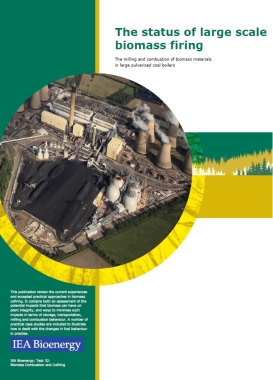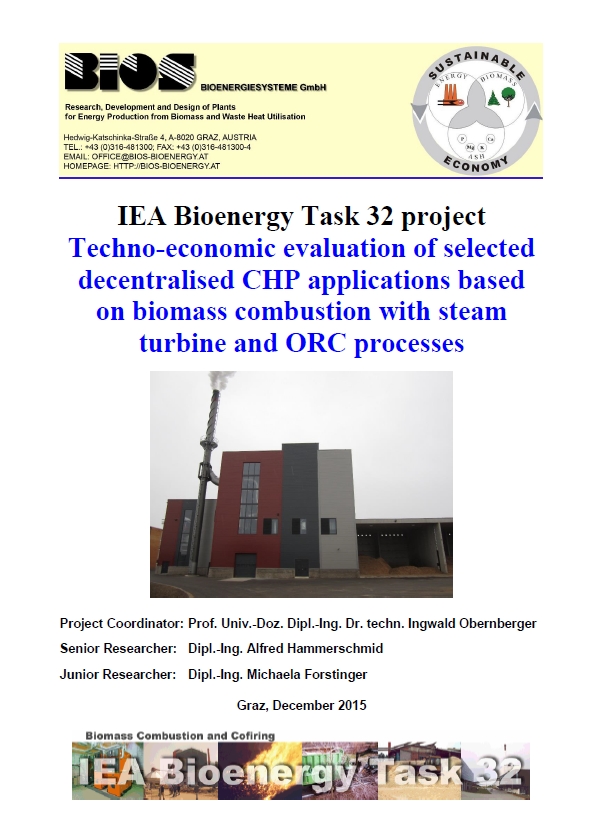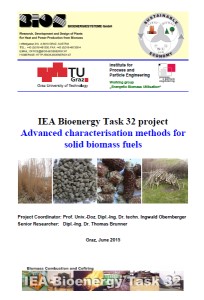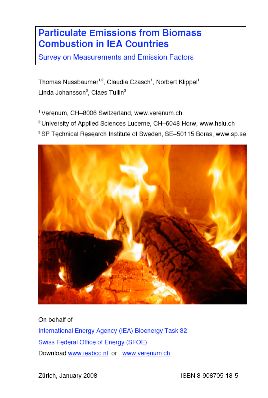Webinar: Residential Wood Combustion – Towards Low Emission Systems
Wood combustion plays a large role for residential heating in many countries. However, inadequate knowledge, poor design of appliances, unrealistic test methods and poor operation of wood stoves lead to undesired and harmful consequences for air quality in many residential areas.
On 6th May 2021, IEA Bioenergy held a webinar which presented the most recent findings from ongoing work within Task 32 on design guidelines for wood stoves and real-life test methods. The webinar consisted of the following presentations, followed by a Q&A session:
- Introduction to biomass combustion and pollutant reduction in wood stoves and boilers, by Prof. Dr. Thomas Nussbaumer (Verenum Research, Switzerland)
- Technical guidelines for design of low emission stoves, by Morten Gottlieb Warming-Jespersen (Danish Technological Institute, Denmark)
- Real life test methods for log wood stoves and pellet stoves, by Dr. Gabriel Reichert (Bioenergy and Sustainable Technologies, Austria)
Morten Tony Hansen (Ea Energy Analyses, Denmark), Lead of IEA Bioenergy Task 32 on Biomass Combustion,moderated the webinar.
Report on health impacts of biomass particles
Task 32 publised a report on the health aspects of biomass combustion originated particles. The report assesses the typical quantity and composition of aerosols emitted from biomass fired stoves and boilers, and reviews the results of recent R&D projects in which the health impacts were evaulated.
This report summarises the current knowledge on the health relevance of combustion generated PM, describes the mechanisms which can cause PM in biomass combustion, describes different particle types, and provides information on measures to reduce PM from biomass combustion. It is important to distinguish carbonaceous and inorganic pollutants as well as primary and secondary aerosols. Organic pollutants are particularly relevant to residential biomass combustion and can be avoided at near-complete combustion conditions. Particles resulting from incomplete combustion in manual devices exhibit a high cytotoxicity, while particles from properly operated automated biomass boilers and furnaces are mainly inorganic (derived from ash constituents in the biomass) and exhibit significantly lower or even undetectable cytotoxicity. In addition, inorganic particles can be removed effectively by air pollution control equipment such as electrostatic precipitators or fabric filters. In summary, biomass can play an important role in future energy supply in an environmentally friendly manner through implementation of state-of-the-art combustion devices and their appropriate operation.
Aerosols from biomass combustion – Technical report, Thomas Nussbaumer, IEA Bioenergy Task 32, 2017
Workshop on new emission measurement methods, 19 January 2017
With existing test methods for biomass boilers and stoves, the emissions are tested under stationary and optimal test conditions. Under practical circumstances however, emissions may be significantly higher, e.g. during cold startup or while operating under partload. This implies that the emissions measured during type approval do not neccessarily reflect actual emissions in the field and may be significantly underestimated.
In order to obtain a result during emission testing that better represents practical conditions, it is therefore desired to modify existing standards to reflect better how the devices are actually used in practise.
Task 32 organised a workshop on 19 Janary 2017 during the Central European Biomass Conference in Graz, Austria, to present an overview of existing emission measurement standards, and evaluate the new method that was proposed in the framework of the BEREAL project.
See here for a report of the workshop, with all presentations and a policy recommendation paper.
Webinar on biomass torrefaction, 27 October 2016
Task 32 and Task 40 have recently published two reports related to biomass torrefaction:
the commercial status of biomass torrefaction
the potential impact on international biomass trade.
On 27 October 2016, there was a live webinar in which the authors present the report in two consequetive presentations, with a Q&A session. The webinar can again be viewed here. The presentation is available here.
Successful task 32 meeting in Japan, Oct 2016
Task 32 held a succesful progress meeting in Maniwa, Japan. The meeting was accompanied with a field trip and discussion workshop with local stakeholders to discuss opportunities for improved utilisation of locally available wood residues. A brief newsitem broadcasted on local television can be found here.
Task 32 workshop on Biomass Combustion Generated Nanoparticles
On 14 May 2016, Task 32 organised a workshop on the formation, mitigation and health impacts of biomass combustion generated
nanoparticles. This workshop was an integral part of the 20th Nanoparticle Conference, held in Zürich from 13-16 June 2016. All presentations are available here.
Task 32 starts with a new triennium
Task 32 will continue its work in supporting cost effective and clean applications of biomass combustion. A workplan for another 3 years was endorsed recently, with activitities varying from woodstoves to industrial CHP and large scale cofiring with coal. Membership of task 32 has expanded to 13 member countries, see here for the contact details of our national team leaders.
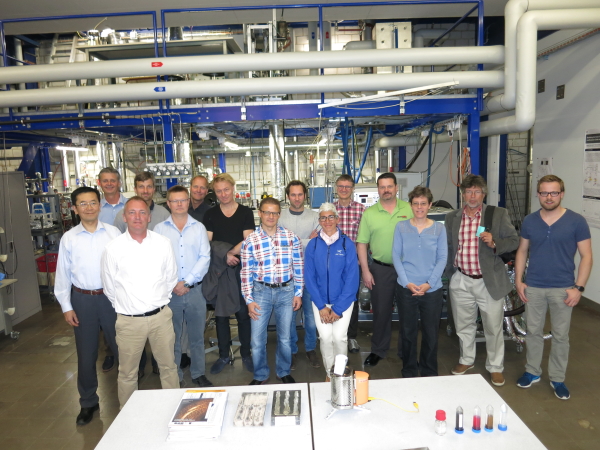
An overview of the work performed during the last triennium (2013-2015) can be downloaded here.
Report: The status of large scale biomass firing
This report provides an overview of the current status of biomass cofiring. This report shows that the firing and co-firing of biomass as a replacement for coal in large pulverised coal boilers can be a very attractive option for the utilisation of biomass materials for power production, and for the delivery of renewable energy.
The key technical options for the conversion of large pulverised coal boilers to the firing and co-firing of biomass have all been successfully demonstrated, principally in projects in Northern Europe, over the past 10-15 years or so. A number of the plants converted to biomass firing and co-firing are currently in operation, and there are a small number of further conversion projects currently in the proposal stage.
The storage and handling of the biomass materials, and particularly the tendency of the biomass to generate significant dust levels, have presented the most significant problems. It is fair to say, however, that the fuel suppliers and the materials handling equipment supply industry have learned many lessons over the past few years, and that the solutions currently being offered for biomass projects represent a significant improvement over previous practice.
The case studies and country reports show that through the years, a great experience has been gained with biomass cofiring in various types of power plants and with various types of biomass fuels. These projects show that the technical risk areas have been managed successfully and that the plant availability and efficiency levels after conversion have been acceptable.
Updated report: Techno-economics of biomass CHP
Task 32 already published a report on the techno-economics of biomass combustion based CHP systems in 2004. This new report provides an updated evaluation of the techno-economic performance of three types of biomass combustion based CHP systems, varying from 130 kWe to 5,7 MWe.
This updated report provides a techno-economic evaluation of three case studies that represent the most relevant small-scale CHP technologies based on biomass combustion relevant for the market at present. It points out the differences between the technologies available, their meaningful integration in heat supply systems based on real-life case studies and a technological as well as economic evaluation and comparison between the technologies. The results provide valuable information about the necessary constraints for a meaningful application of these technologies and a good basis for future design, application and operation of such plants but also for meaningful further developments.
Updated report: Status overview of torrefaction technologies
The maturation and market introduction of torrefaction technologies has gone slower than anticipated 5 years ago, when it was expected that a significant fraction of the biomass pellets supplied today could have been replaced by torrefied pellets.
It has been hard to fully prove the claims made earlier on product characteristics, and several companies have gone bankrupt due to inability to produce good quality product or due to a lack of buyers.
Nevertheless, it is clear that the companies involved have significantly improved their ability to produce high quality products, with pellets of comparable durability to conventional wood pellets.
This report provides an update of the 2012 report by Task 32, including some of the key results of recent research projects on torrefaction.
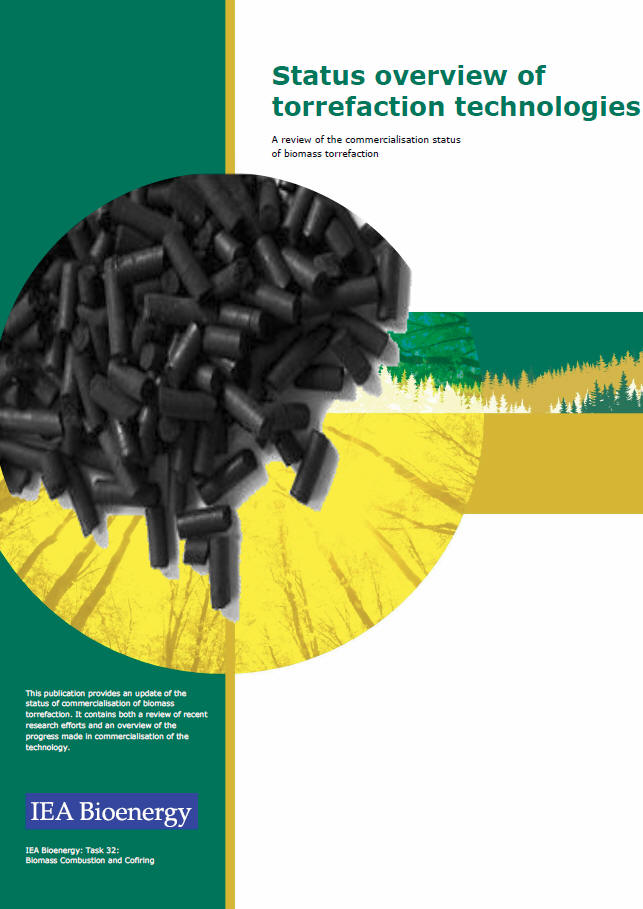
Expert workshop on Highly Efficient and Clean Wood Log Stoves
Fireplaces and woodlog stoves that burn wood in a suboptimal manner are an important source of particle emissions in Europe. By phasing out polluting woodstoves and introducing better stoves, better stove installations and educating stove users, large emission reductions can be achieved.
Experts from IEA Bioenergy task 32 (Biomass Combustion and Cofiring), in collaboration with various national and European branche organisations have jointly organized an expert workshop on ways to introduce efficient and clean wood log stoves. This workshop was held on Thu 29 Oct in Berlin.
All presentations from the workshop can be found here.
Report on advanced biomass fuel characterisation methods
Biomass fuel characterisation is a relevant issue for all thermo-chemical conversion technologies. Recently several advanced biomass fuel characterisation techniques were developed that can better help in defining the behaviour of a fuel during the pyrolysis, gasification and combustion stage, as compared to traditional chemical analysis methods.
These advanced fuel characterisation methods have their specific advantages as well as and a certain application range. This study provides an overview on the strengths and weaknesses of the different methods, as well as their specific fields of application.
Reports published on biomass combustion and district heating systems
Compared to small scale decentralised biomass boilers, district heating enables the use of larger boilers that can achieve higher combustion efficiencies and lower pollutant emissions at lower costs. However, district heating itself also induces additional costs and energy losses. Therefore it is a challenge to find the most economic and efficient design of the overall biomass fired district heating system.
VERENUM prepared two reports for Task 32 on the optimisation of biomass fired district heating networks to analyse where improvements can be made in both the design and operation. A summary of the analysis can be found here, the reports can be downloaded from below:
The first report contains a theoretical assessment of the influence of system design parameters on heat distribution cost. The report shows what design optimisations can be made for pipe diameter, temperatures maintained, and insulation class based on given line heat density and the utilisation rate.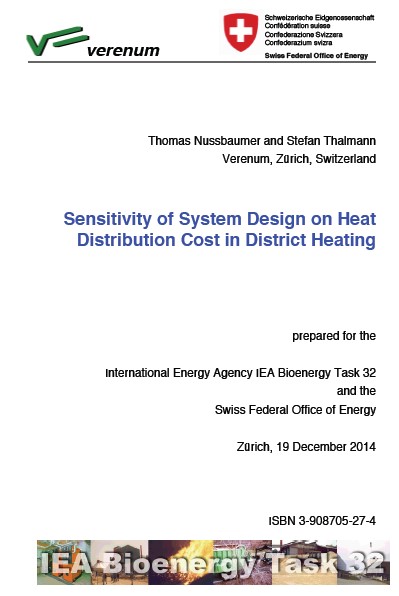
The second report contains an evaluation of the performance of actually operating district heating networks, and shows the difference between individual countries.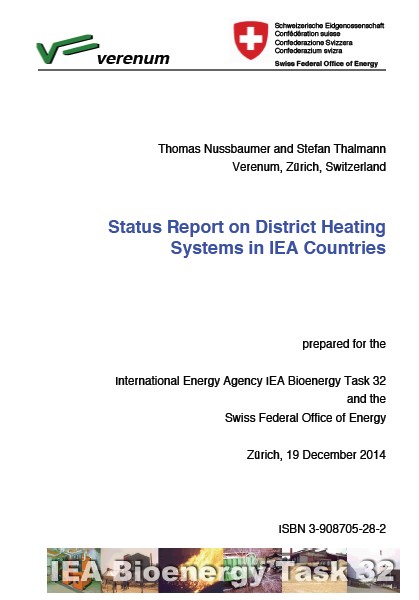
Expert workshop on Opportunities for Bioenergy in South Africa
4 November 2014, IEA Bioenergy Task 32 and ESKOM jointly organised an expert workshop on the opportunties for bioenergy in South Africa. The workshop aimed at discussing the potential for applying various bioenergy technologies in the South African economy.
The presentations can be downloaded here.

Factsheet on gasification for indirect cofiring available
IEA Bioenergy Task 33 has produced a factheet on gasification for indirect cofiring of biomass with coal. The factsheet is available here.
Workshop on High Temperature Corrosion in biomass combustion plants at the World Bioenergy Conference
Biomass power plant owners increasingly thrive for the use the cheap and therefore low biomass grades available, while maintaining high electrical efficiencies. This often results in corrosion related challenges for the boiler materials used.
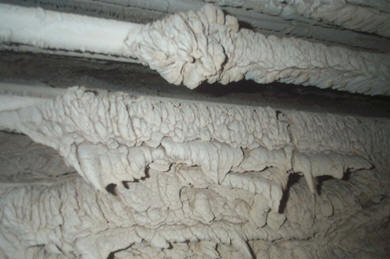
Task 32 therefore organised a workshop on the problem of high temperature corrosion, at the World Bioenergy Conference, wednesday 4 June 2014. The workshop provided an overview of the fundamental mechanisms behind high temperature corrosion, as well as a number of practical ways to mitigate the corrosion to acceptable levels.
The presentations from the workshop are available here.
Torrefaction workshop at the Central European Biomass Conference
Friday 17 Jan 2014, Task 32, Task 40 and the EU SECTOR project organised a workshop on recent progress in the development of torrefaction technologies.
The workshop was held as part of the Central European Biomass Conference in Graz, Austria. All presentations and a summary from the torrefaction workshop
are available here.
VGB Biomass Combustion Conference
Task 32 supported the VGB Biomass Working Group in the organisation of the expert conference `Challenges in Biomass Combustion´, 13/14 November 2013 in Berlin.
The conference covered practical experiences on key operational challenges, varying from ash depositon to fire safety.
Expert workshop on CFD for design of industrial biomass combustion technologies
Task 32 organised an expert workshop as a side event of the EU Biomass Conference for equipment suppliers and researchers to share practical experiences and address the current opportunities and limitations of CFD based design of industrial biomass combustion appliances.
CFD tools can be very effective in the design of industrial biomass combustion installations. The approach can lead to much better combustion quality and avoid the need of a ‘try and error’ approach for boiler design and reducing development expenses.
The presentations can be downloaded here.
IEA Bioenergy Health and Safety review published

The rapid increase in the production and use of various types of biomass as energy carrier also leads to an increase in handling and storage activities throughout the supply chain. The properties of a biomass material and the intended use determine how the material should be safely transported and stored.
Self-heating, off-gassing and dust explosions are significant challenges for the industry that have already resulted in significant losses of capital investments and even tragic loss of life. Likewise, exposure to biologically active material, such as moulds and spores may form a serious hazard for the health of workers involved. With the growth of the bioenergy sector, it is important not only that opportunities for bioenergy are implemented in an efficient and economic manner, but also safely.
IEA Bioenergy recognises the importance of safe production, trade and utilisation of a growing amount of biomass fuels. This publication focuses on the health and safety issues of the supply chain of solid biofuels with the objective to highlight commonly used mitigation methodologies to promote a better working environment when dealing with solid biofuels. It has been compiled as a joint effort by experts active in Task 32, 36, 37 and 40 of the IEA Bioenergy Agreement, with their own specific fields of expertise.
Although this publication does provide the reader with significant understanding of the relevant safety issue as well as several guidelines for handling, storage and transportation, it is important to realize that differences in material also lead to differences in risks and needs for safety measures, and every individual situation needs to be carefully assessed. The topic also remains important as new biofuels enter the market.
The full report can be downloaded here.
Torrefaction review published
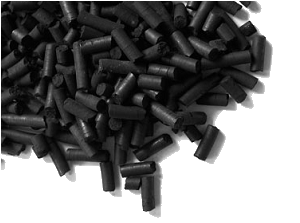 Task 32 prepared a review of torrefaction technologies, describing the technology status, advantages and disadvantages, economical aspects and potential impact.
Task 32 prepared a review of torrefaction technologies, describing the technology status, advantages and disadvantages, economical aspects and potential impact.
The report can be downloaded here.
Workshop on aerosols in small scale combustion at IEA Bioenergy Conference in Vienna, 13-15 November 2012
At the IEA Bioenergy Conference in Vienna, Task 32 organised a special session on recent developments in small scale biomass combustion technologies, with a focus on formation, impact and mitigation of aerosols. The presentations can be found here.
Torrefaction workshop at the EU Biomass Conference
Task 32 and the EU SECTOR project jointly organised a workshop on torrefaction as parallel event at the last EU Biomass Conference in Milan.
The presentations of the workshop can be downloaded here.
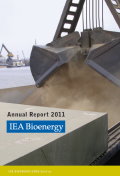 Special feature article on biomass pellets in IEA Bioenergy annual report
Special feature article on biomass pellets in IEA Bioenergy annual report
Task 32 was responsible for a feature article on developments in the 2011 annual report of IEA BIoenergy. This article, prepared by the authors of the Pellet Handbook, gives a very good overview of the current situation with regard to production and utilisation of biomass pellets.
The annual report is available here.
Report on Options for increased utilisation of ash from biomass combustion and cofiring
KEMA, TU Graz and BIOS BIOENERGYSYSTEME GmbH recently performed a survey on behalf of Task 32 on the options for increased utilisation of biomass ash. The study covers different ash fractions from both dedicated combustion installations as well as biomass cofiring installations. In the report, both existing applications in the Task 32 member countries are listed, and possibly future applications are indicated.
The full report is available here.
Status report on small scale particle precipitiation devices
 On behalf of Task 32, TU Graz and BIOS BIOENERGYSYSTEME GmbH carried out a survey on the present status of various technologies for particle precipitation for residential biomass combustion (up to 50 kW).
On behalf of Task 32, TU Graz and BIOS BIOENERGYSYSTEME GmbH carried out a survey on the present status of various technologies for particle precipitation for residential biomass combustion (up to 50 kW).
The first part of the report gives an overview of the current level of emissions from small scale biomass combustion in the various Task 32 member countries, and the need to reduce these emissions.
The second part of the report provides an assessment of the various technologies currently under development in terms of their technical performance, costs and convenience.
The full report is available here.
International workshop on Cofiring Biomass with Coal, Copenhagen, 27-28 March, 2012
Together with the IEA Clean Coal Centre and VGB Powertech, IEA Bioenergy Task 32 organised a 2-day international workshop on Cofiring Biomass with Coal to highlight the latest developments in this field. The workshop was held 27-28 March, 2012 in Copenhagen, Denmark.
The presentations of the workshop can be downloaded here
Irish national workshop on local developments in small scale biomass combustion, Dublin, 18 October, 2011
 IEA Bioenergy Task 32 organised a national Irish workshop on ‘Local developments in Small Scale Biomass Combustion’ in Dublin, together with Sustainable Energy Authority Ireland and Teagasc.
IEA Bioenergy Task 32 organised a national Irish workshop on ‘Local developments in Small Scale Biomass Combustion’ in Dublin, together with Sustainable Energy Authority Ireland and Teagasc.
The presentations can be downloaded here
Workshop on Processing routes for Solid Recovered Fuels, Dublin, 20 October, 2011
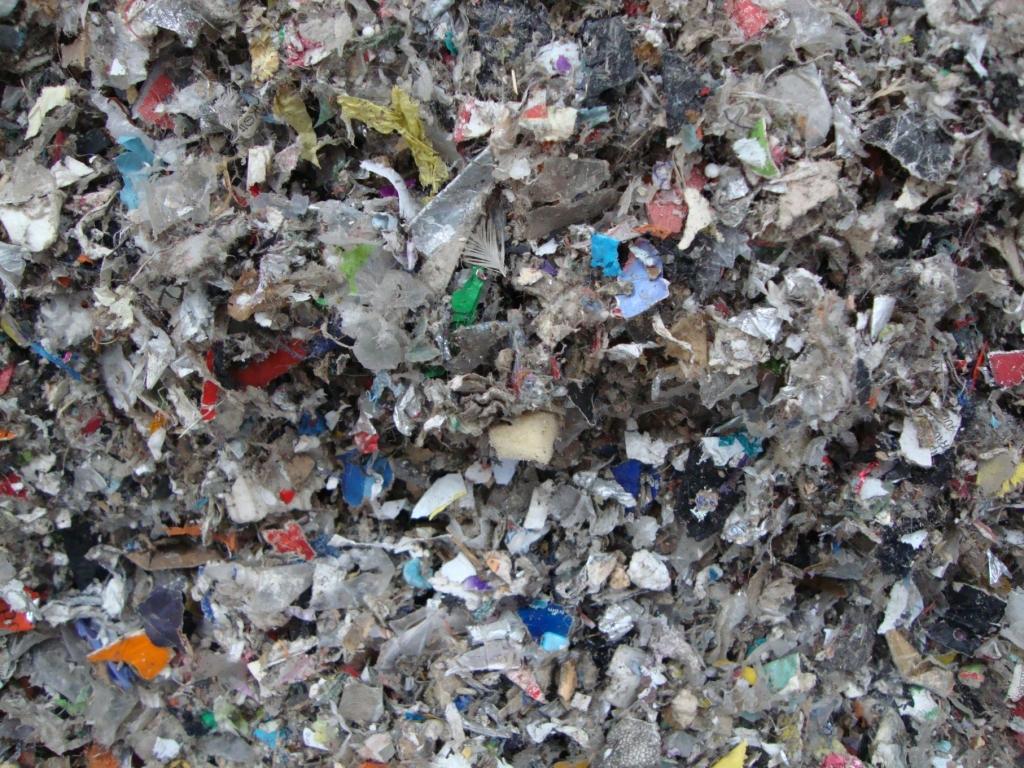 IEA Bioenergy Task 32 and Task 36 have jointly organised a workshop and field trip in Dublin to discuss the market opportunities for Solid Recovered Fuels.
IEA Bioenergy Task 32 and Task 36 have jointly organised a workshop and field trip in Dublin to discuss the market opportunities for Solid Recovered Fuels.
The presentations can be downloaded here
Workshop on Aerosols from Small Scale Biomass Combustion plants, Graz, 27 january, 2011
IEA Bioenergy Task 32 organised a workshop on ‘Aerosols from Small-scale Biomass Combustion Plants’, as part of the Central European Biomass Conference (CEBC) in Graz. The workshop gave a status update of the current knowledge of the formation mechanisms, primary and secondary mitigation measures and health impacts.
Presentations from the workshop can be downloaded here
Workshop on Torrefaction technologies, Graz, 28 january, 2011
IEA Bioenergy Task 32 and 40 jointly organised a workshop on the development of torrefaction technologies and the possible impacts on global bioenergy use and international bioenergy trade.
This workshop was organised as part of the Central European Biomass Conference (CEBC) in Graz. The presentations are available here .
Email newsletter
IEA Bioenergy Task 32 now has an electronic newsletter! Sign up here to receive the newsletter twice per year.
 Workshop on “State-of-the-art technologies for small biomass co-generation”
Workshop on “State-of-the-art technologies for small biomass co-generation”
IEA Bioenergy Task 32 and 33 have jointly organised a workshop on new developments in small scale power production from solid biomass.
The workshop was held Thursday 7 October 2010 in Copenhagen and attracted about 85 participants.
The presentations and the full report including an evaluation of the technologies are available here.
The Pellet Handbook
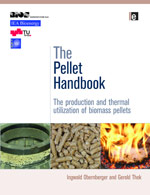 Task 32 took the initiative to compose a very comprehensive handbook on pellet production and utilisation.
Task 32 took the initiative to compose a very comprehensive handbook on pellet production and utilisation.
This handbook was written and edited by experienced professionals
from IEA Bioenergy Task 32 in cooperation with BIOS BIOENERGIESYSTEME GmbH, Graz, Austria, other IEA Tasks and external experts. It is the first comprehensive guide (over 500 pages) in English language covering all pellet related issues, such as quality standards, application markets and technologies, production methods, logistical aspects, etc.
The book can be ordered at publisher Routledge Taylor and Francis. More details can be found here.
Paperback edition of Combustion Handbook available
 The Handbook of Biomass Combustion and Cofiring is now available as a paperback edition against a discounted price of 49.99 Euro. It is very comprehensive and well suited for education purposes.
The Handbook of Biomass Combustion and Cofiring is now available as a paperback edition against a discounted price of 49.99 Euro. It is very comprehensive and well suited for education purposes.
Click here for more information on the contents or here for a direct link to the publisher’s ordering page.
Expert meeting on Combustion of Challenging Biomass Fuels
An upcoming issue driven by the difference in fuel price of is the
desire to burn uncommon and challenging fuels with low ash melting
temperatures and high N and Cl content, such as (pellets from) agrifuels
such as straw and press cake, reed canary grass, RDF, chicken litter,
etc.
The combustion technology needs to be properly designed or adapted to
be able to deal with these fuels, as it may lead to excessive corrosion
in boiler tubes, excessive slagging and fouling as well as much higher
emission of NOx and (fine) particles.
At the same time, it can be observed that the superheater steam
temperature (and thereby electric efficiency) of biomass power plants
for challenging fuels has over the years increased significantly, for
example there are power plants based on straw that generated steam of
540°C. This mainly depends mainly on the biomass composition, the boiler
configuration and the boiler materials used.
At the European Bioenergy Conference in
Lyon (May 2010), Task 32 organised an expert workshop on
‘Combustion of Challenging Biomass Fuels’ . The presentations are
available here .
Review paper on modelling Slagging and Fouling in Cofiring available
A review paper on models and tools for predicting slagging and
fouling in installations that cofire biomass, was prepared under
coordination of KEMA and is available
here.
Continuation of Task 32
Task 32 has received an extension of its activities until 2012. From
2010 onwards, the number of countries involved will increase to 14.
Activities to be performed are
| Workshops: |
Task studies |
|
|
Status report on biomass cofiring available
Task 32 prepared a technical status report on biomass cofiring, based
on the updated cofiring database as
well as other information. The report can be obtained
here.
Expert meeting on high percentage biomass cofiring in new power
plants
At the European Bioenergy Conference in Hamburg (June 2009), Task 32 organised
a workshop on options for high percentage biomass cofiring in new power
plants. The full report and all individual presentations can be obtained
here.
Expert meeting on increasing cofiring percentages in existing power
plants
Task 32 organised an expert meeting on 21 October 2008 in Amsterdam
on increasing cofiring percentages in existing coal fired power plants.
The presentations can be obtained
here.
Expert meeting on new developments in small scale biomass combustion
technologies
Task 32 organised an expert meeting on 20 October 2008 in Amsterdam
on new developments in small scale combustion technologies, with a focus
on cleaner combustion. The presentations can be obtained
here.
Handbook of Biomass Combustion and Cofiring in Chinese!
The Handbook of Biomass
Combustion and Cofiring has been translated into Chinese by the
Chinese Center of Energy and Environmental Protection, Ministry of Agriculture.
During the recent Task meeting, held in Beijing, the book was presented
to members of Task 32.
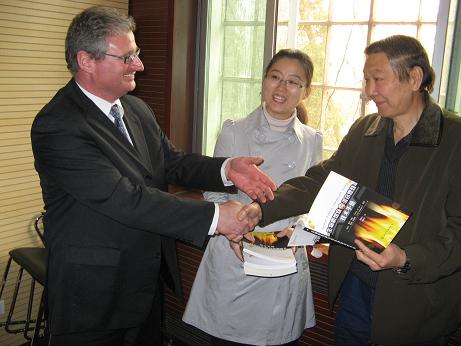
Individual presentations from the export workshop on biomass cofiring
opportunities in China can be downloaded
here.
Report available on particulate emissions from biomass combustion on
IEA Bioenergy Task 32 member countries
One of the major arguments against small scale biomass combustion
systems is the relatively high concentrations of aerosols emitted in
many cases. With technology development, the quantities of aerosols
emitted from biomass combustion systems have however significantly
improved over time. Between different systems, significant differences
in emission factors can be observed.
Task 32 carried out an inventory of particulate emissions originated
from small biomass combustion systems used in its member countries. The
inventory yielded interesting information on emission factors of
different small scale combustion systems (woodlog stoves, pellet stoves,
open fireplaces, etc) currently on the market. The report also evaluates
the influence of the different measurements standards in use for
measuring aerosols.
The work was done under coordination of
Verenum, Switzerland,
with major input from SP,
Sweden and other task 32 members.
The report is available
here for
download (1.8 MB).
Expert workshop on Aerosols from Biomass Combustion held in Jyväskylä, 3
sept 2007
At
BIOENERGY 2007, held
3-6 Sept 2007 in Jyväskylä, Finland, Task 32 organised an expert workshop on ‘Aerosols
from Biomass Combustion’. The presentations are available
here.

Report of Berlin Task 32 meeting available
The minutes of the 1th task 32 meeting in the new
triennium, held May 2007 in Berlin, Germany, are available
here for
download (8 MB).
2nd edition of Handbook on Biomass Combustion and Cofiring can be
ordered!
The first edition of the Task 32 produced Handbook on Biomass
Combustion and Cofiring is completely sold out. A new, revised edition
has been prepared and is now available
here.
Task 32 organised workshop on Pretreatment and System Analysis in
Berlin
At the 14th European Conference and Exhibition on Biomass held in
Berlin, Task 32 organised a workshop on ‘Fuel storage, handling
and preparation and system analysis for biomass combustion
technologies’, The presentations are available
here.
Report available on determination of efficiencies of automatic
combustion plants
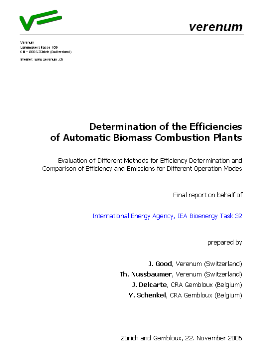 With
With
support of Task 32, Verenum of Switzerland and CRA Gembloux of Belgium
evaluated different methods for the determination of the efficiencies of
automatic biomass combustion plants.
For this purpose, detailed formula for the combustion efficiency, the
boiler efficiency and the annual plant efficiency were described and
methods for direct and indirect determination are distinguished.
Furthermore, a calculation of the uncertain¬ties is carried out for each
method.
The report is available
here for
download (2.3 MB).
Workshop on Ash Deposition and Corrosion
In combination with a task meeting, Task 32 organised a workshop
on ash deposition and corrosion on 20 Sept 2006 in
Glasgow, Scotland. Presentations of this event are available
here.
Report of workshop on fuel flexibility
At the World
Bioenergy 2006 conference in Jönköping, Sweden, held
May 30-June 1, 2006, Task 32 organised a workshop on fuel
flexibility issues in biomass combustion systems. Click
here for more
information and the report.
New version of Average Fuelsim available
Average-Fuelsim is a relatively simple, but useful, mass,
volume and energy balance spreadsheet written in MS-EXCEL for continuous
combustion processes. Version 1.2. is now available, amongst others it
contains a correction of a few minor errors. It can be downloaded here.
Workshop on public perception of biomass cofiring
Task 32 has organized a workshop on the public perception of biomass
cofiring at the conference on Science in Thermal and Chemical Biomass
Conversion, August 30-Sept 3, 2004 in Victoria, Canada.
The report of the workshop can be downloaded here. Task
members can download the draft minutes of the Task meeting of 3 September
2004 here.
End of Task report now available
A report has been prepared that describes the progress that has been
achieved by Task 32 in the triennium 2001-2003. It can be downloaded here
(970 kB).
Two new reports available on biomass CHP systems
| Two new reports, related to biomass combustion based CHP systems have been produced by BIOS with very interesting details. The titles are:Basic information regarding decentralised CHP plants based on biomass combustion in IEA partner countries. (423 kB).Techno-Economic evaluation of selected decentralised CHP plants based on biomass combustion in IEA partner countries. (1.27 MB) |
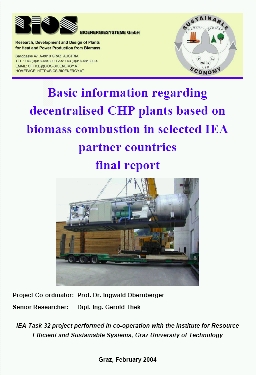 |
Report available on Cumulative Energy Assessment
| A report has been produced by VERENUM on ‘Evaluation of Biomass Combustion based Energy Systems by Cumulative Energy Demand and Energy Yield Coefficient’. The work has been supported by Task 32.Click here to download the full report (1.61 MB). |
 |


